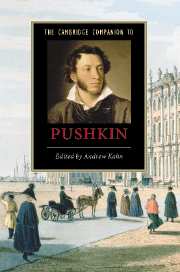Book contents
- Frontmatter
- Introduction
- Part I Texts and Contexts
- Part II The Pushkinian tradition
- 11 Pushkin in music
- 12 Pushkin and Russia Abroad
- 13 Pushkin filmed: life stories, literary works and variations on the myth
- 14 Pushkin in Soviet and post-Soviet culture
- Appendix on verse-forms
- Guide to further reading
- Index
12 - Pushkin and Russia Abroad
from Part II - The Pushkinian tradition
Published online by Cambridge University Press: 28 March 2007
- Frontmatter
- Introduction
- Part I Texts and Contexts
- Part II The Pushkinian tradition
- 11 Pushkin in music
- 12 Pushkin and Russia Abroad
- 13 Pushkin filmed: life stories, literary works and variations on the myth
- 14 Pushkin in Soviet and post-Soviet culture
- Appendix on verse-forms
- Guide to further reading
- Index
Summary
The charge of social and cultural energy inherent for Russians in the figure of Pushkin and his legacy was released in the diaspora of the 1920s and 1930s with extraordinary force and consequence. The staggering dislocations of war and revolution caused the mass exodus of Russians from their native land in the five years following 1917. It has been plausibly argued that social upheavals over a period of time exert a substantial influence on the self-definition of given communities, and in this case both the émigrés and the Russians at home redefined themselves culturally. Inevitably, Pushkin’s experiences of exile and the trauma of his violent death in 1837 had special resonance among the newly dispossessed. The first wave of emigration, especially in the deportations of 1922, carried with it a disproportionate number of the highly educated cultural elite determined to preserve not only their Russian identity, but to create a culture abroad. Language and literature contained the dynamic energy to invigorate such a project, for which Pushkin was its unifying symbol. Pushkin had come to embody for Russians an intense vitality, especially since the historic anniversary observances of 1880, and the potency of Pushkin’s name was continually reaffirmed in Russia Abroad during the period between the twentieth century’s two world wars. The discussion that follows is bracketed by the Pushkin celebrations of 1924 and 1937 and is focused on activities in Paris, the capital of Russia Abroad.
- Type
- Chapter
- Information
- The Cambridge Companion to Pushkin , pp. 174 - 187Publisher: Cambridge University PressPrint publication year: 2006
- 1
- Cited by

